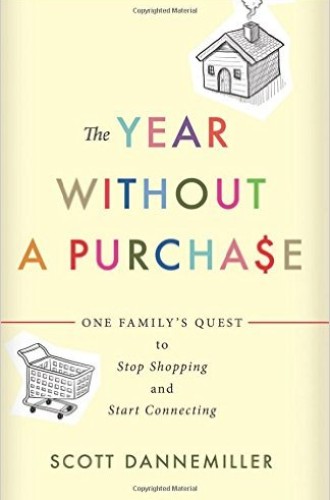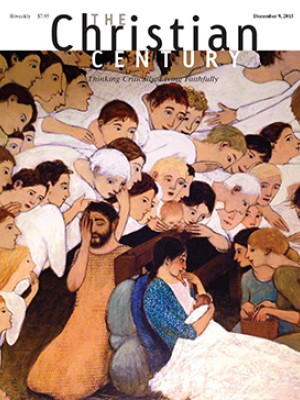Material values
Africa, where my family and I lived, was always a lesson in the value of material things. Perhaps that seems counterintuitive: the well-worn trope of the affluent visitor to the developing world is supposed to be about the value of people and relationships over material things. The stories we tell upon returning from a mission trip are supposed to illustrate that one can have next to nothing and still be happy.
Aside from the fact that telling this sort of story has the dehumanizing effect of using people as object lessons, the story itself is a lie, because no one understands the value of a pair of shoes or a pack of birth control pills better than a woman from the village whose bare feet are scalded by the hot earth as she walks six miles to the clinic to get her supply of contraceptives, then back again.
Read our latest issue or browse back issues.
Indeed, what one sees in the market in Malawi is evidence that material things matter very much. Matter matters; the apparent pun is etymology telling the truth, particularly when resources are scarce. In Malawi, we could find someone to fix almost anything that was broken. We enjoyed the beauty of people making ingenious use of what they had: soccer balls from carefully saved plastic bags, rope from old tires.
Like me, Scott Dannemiller is a former mission worker with the Presbyterian Church (U.S.A.). He and his wife spent a year in Guatemala. While there, inspired by the simplicity of the life they shared with their host family, the couple developed a “mission statement” for their life together: “to tirelessly seek God’s will each day by living lives of integrity, owning what we have, growing together in faith, and serving God’s people to build a world without need.”
It was simple enough to live according to this statement when they were still in Guatemala, where they used an outhouse, shared a droopy twin bed, and bathed only weekly, in water heated by burning garbage. “Our lives weren’t perfect, but they were incredibly peaceful,” Dannemiller writes. “And then we ruined it.”
They returned to the United States and began to build their life here once again, complete with two jobs, two kids, and a picket-fenced house in the suburbs. Dannemiller narrates his family’s straying from their stated ideal, but offers little detail about that experience beyond conveying the vague sense of being surrounded by all the gear that children tend to accumulate, of their free time being eaten up with home maintenance and improvement, and of being overwhelmed by the potlatch that is the American Christmas.
When his wife suggests that they buy nothing for a year—to see if they can reclaim something of the peace that accompanied their year of simplicity in Guatemala—he reluctantly agrees. For a year, they will buy only things that can be used up. They will fix things that break (if the cost of fixing is cheaper than the cost of replacement, which, in the United States, it almost never is), and they will give gifts only in the form of charitable donations or “experience gifts”—tickets to an event or a certificate for a dinner out.
Dannemiller’s narration of this year of simpler living is well written and jocose throughout, though at times the humor is a bit excessive or overly revelatory. I could have done without certain
information about Dannemiller’s vasectomy and the garments borrowed thereafter from his brother-in-law for “supportive” purposes. And while the overall significance of the family’s project seems worthwhile—removing their focus from self and stuff to concentrate on serving and being with others—the connections sometimes feel forced.
For example, Dannemiller forgets to bring extra socks on a business trip, then remembers that his self-imposed rules prevent him from running to the nearest big-box store for new ones. He then spends the evening struggling to wash, rinse, and dry his socks in his hotel room, with only partially successful results. This, he says, helped him feel a bit closer to Graciela, his hostess in Guatemala, who uncomplainingly scrubbed all her laundry every day. As it happens, I have known many Guatemalans and have stayed for some weeks in Guatemalan homes, and it is easy for me to imagine that Graciela’s response to this revelation would have been something along the lines of “Mijo, por qué no vas a Target?”: Son, why didn’t you just go to Target?
Dannemiller does considerably better in recounting the business trips taken after his sedate black suitcase breaks irreparably, and he’s reduced to rolling a shockingly lavender one: “If this bag had a scent,” he writes, “it would smell like an infant Liberace wearing your grandmother’s perfume.” But in dragging it around and enduring the occasional snide remarks and snickers, he recognizes the lie that Americans too often believe—that we are what we own; that our respectability as human beings is somehow reflected by or based on the material goods we possess.
The statistics and scientific evidence that pepper the book are for the most part well chosen: it’s good to know, for example, that while we do receive an addictive, drug-like lift from making new purchases, people aren’t as inherently self-serving as certain fallacious extensions of Darwinian thought are sometimes taken to imply. We get a jolt from giving too. By the end of the year, Dannemiller’s family has given nearly twice as much as they normally give to charity, has engaged in more hands-on works of service than they ever have before, and have lacked for nothing: not for food, shelter, or good times.
By the end, Dannemiller acknowledges that “stuff” is not “inherently bad. What makes it bad is the value we place on it.” There is nothing wrong with having a high-quality suitcase—so long as it isn’t forced to be a proxy for the content of our character, which is precisely how a certain kind of marketing would have it.
At the end of the year, the Dannemiller family purchases a car for a single mother who is unable to take a nursing job if she doesn’t have her own transportation. Though Dannemiller doesn’t tease them out, the paradoxical implications of this are profound: for those with more than enough, stuff easily becomes clutter, something of which to rid ourselves in an experiment that provides fodder for our writing. But for those who lack, material things matter. Sometimes a pair of shoes or a car or the right kind of suit means the difference between destitution and hope.
Perhaps the spiritual lesson to be learned is that matter matters. Jesus was materialistic enough: share this bread, this wine, my body—share this stuff that is not antithetical to the value of people and relationships, but constitutive of that value and thus to be handled with care.






